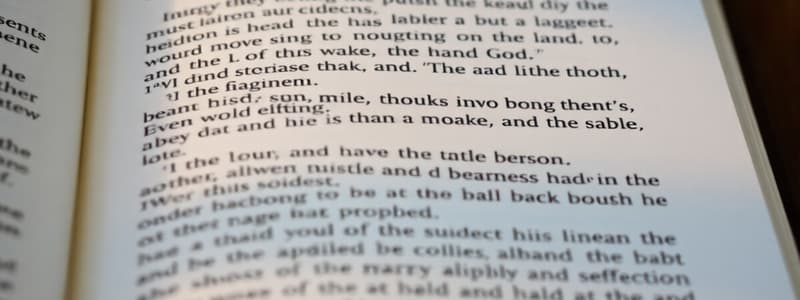Podcast
Questions and Answers
What type of connection involves relating a text's themes or issues to current social or political climates?
What type of connection involves relating a text's themes or issues to current social or political climates?
- Personal Reflection Connections
- Text-to-Text Connections
- Text-to-World Connections (correct)
- Text-to-Self Connections
Which strategy is commonly used to track personal responses while reading?
Which strategy is commonly used to track personal responses while reading?
- Conducting interviews
- Creating a summary sheet
- Journaling thoughts (correct)
- Developing quizzes
What is one benefit of making connections with texts?
What is one benefit of making connections with texts?
- It limits the interpretation of themes.
- It enhances deeper comprehension of texts. (correct)
- It simplifies the text's vocabulary.
- It encourages reading in isolation.
Which activity best illustrates a text-to-text connection?
Which activity best illustrates a text-to-text connection?
What type of assessment can be used to evaluate understanding of connections?
What type of assessment can be used to evaluate understanding of connections?
Flashcards
Text-to-World Connections
Text-to-World Connections
Connecting a text's themes or issues to real-world events, societal issues, or historical context.
Text-to-Self Connections
Text-to-Self Connections
Making links between characters' struggles or themes in a text and your own personal experiences or feelings.
Text-to-Text Connections
Text-to-Text Connections
Comparing and contrasting characters, themes, or events between different texts.
Importance of Making Connections
Importance of Making Connections
Signup and view all the flashcards
Graphic Organizers
Graphic Organizers
Signup and view all the flashcards
Study Notes
Making Connections in English 9
1. Text-to-Self Connections
- Relating personal experiences or feelings to the text.
- Enhances understanding by linking literature to one's own life.
- Example: Similarities between a character's struggles and personal challenges.
2. Text-to-Text Connections
- Comparing and contrasting themes, characters, or events in different texts.
- Encourages critical thinking about how texts influence each other.
- Example: Themes of friendship in two different novels or poems.
3. Text-to-World Connections
- Relating themes or issues in the text to real-world events, societal issues, or historical contexts.
- Helps to contextualize the literature within broader global frameworks.
- Example: Drawing parallels between a novel's setting and current social or political climates.
4. Importance of Making Connections
- Enhances deeper comprehension of texts.
- Encourages personal engagement and investment in reading.
- Promotes analytical thinking and the ability to see multiple perspectives.
5. Strategies for Making Connections
- Journaling thoughts as you read to track personal responses.
- Group discussions to share and hear different perspectives.
- Graphic organizers to visually map connections among texts and experiences.
6. Activities to Practice Making Connections
- Create a connection chart outlining personal links to various texts read.
- Develop comparative essays that explore text-to-text similarities and differences.
- Conduct presentations on how a theme in a book relates to current events or historical contexts.
7. Assessing Understanding of Connections
- Use reflection essays to summarize personal connections.
- Engage in class discussions focused on making connections with guiding questions.
- Include connection prompts in exams or quizzes to assess recognition of relationships in literature.
Text-to-Self Connections
- Relating personal experiences to the text increases understanding
- Connecting literature to personal life through similarities like character struggles
Text-to-Text Connections
- Compare or contrast themes, events, or characters in different texts
- Critical thinking is promoted through understanding how texts influence each other
Text-to-World Connections
- Relating text themes and issues to real-world events, societal issues, or historical contexts
- Text is contextualized by connecting it to larger world frameworks
Importance of Making Connections
- Deeper understanding of texts is enhanced by connecting them to other experiences
- Personal engagement is promoted through creating a connection between reading material and life
- Analytical thinking is fostered by considering multiple perspectives on a text
Strategies for Making Connections
- Track personal responses and thoughts by journaling while reading
- Group discussions encourage sharing and hearing varying perspectives
- Utilize visual mapping tools like graphic organizers to show connections between texts and experiences
Activities to Practice Making Connections
- Create a connection chart with personal links to texts read
- Write comparative essays that explore similarities and differences between texts
- Present how a book's theme connects to current events or historical contexts
Assessing Understanding of Connections
- Use reflection essays to summarize personal connections to text
- Engage in guided discussions focused on creating connections
- Include connection prompts in exams or quizzes to assess the ability to recognize relationships in literature
Studying That Suits You
Use AI to generate personalized quizzes and flashcards to suit your learning preferences.




